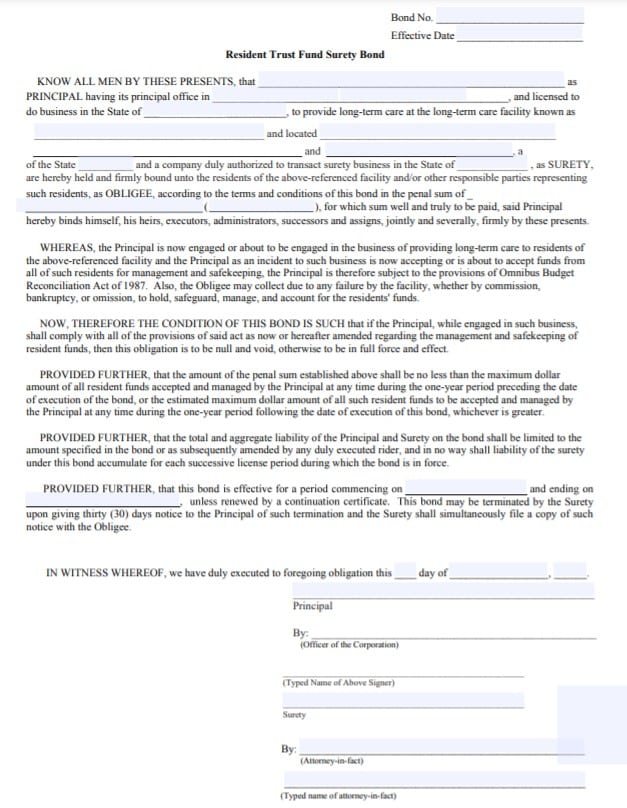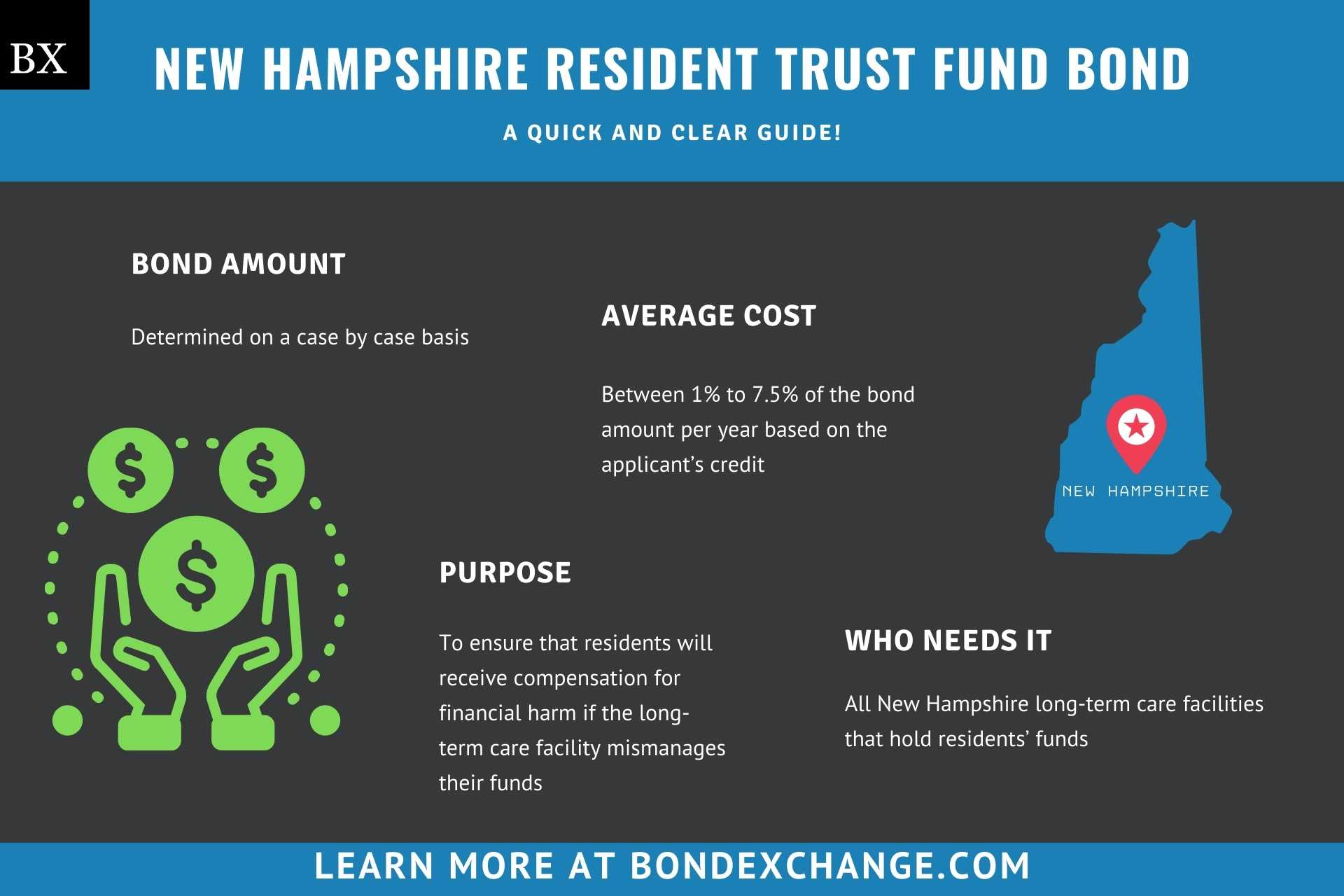New Hampshire Resident Trust Fund Bond: A Comprehensive Guide
This guide provides information for insurance agents to help their customers obtain a New Hampshire Resident Trust Fund bond
At a Glance:
- Lowest Cost: 1% of the bond amount per year based on the applicant’s credit
- Bond Amount: Determined on a case by case basis (more on this later)
- Who Needs it: All New Hampshire long-term care facilities that hold residents’ funds
- Purpose: To ensure that residents will receive compensation for financial harm if the long-term care facility mismanages their funds
- Who Regulates Long-Term Care Facilities in New Hampshire: The New Hampshire Department of Health and Human Services (DHHS)

Background
New Hampshire statute 151:2 requires all long-term care facilities operating in the state to obtain a license with the DHHS. The New Hampshire legislature enacted the licensing requirement to ensure that long-term care facilities engage in ethical business practices. To provide financial security for the enforcement of the licensing law, long-term care facilities that hold residents’ funds must purchase and maintain a surety bond to be eligible for licensure. Additionally, federal statute 483.10 requires all long-term care facilities that hold resident funds in a trust account to purchase a surety bond or other similar form of security. However, the federal regulation leaves the implementation and enforcement of this requirement to individual states.
What is the Purpose of the New Hampshire Resident Trust Fund Bond?
New Hampshire requires long-term care facilities that manage resident funds to purchase a surety bond as a prerequisite to obtaining a business license. The bond ensures that residents will receive compensation for financial harm if the long-term care facility fails to abide by the regulations outlined in New Hampshire statute 151:2. Specifically, the bond protects residents if the long-term care facility in any way mismanages their funds. In short, the bond is a type of insurance that protects residents if the long-term care facility acts unethically with their money.
How Can an Insurance Agent Obtain a New Hampshire Resident Trust Fund Surety Bond?
BondExchange makes obtaining a New Hampshire Resident Trust Fund bond easy. Simply log in to your account and use our keyword search to find the “trust fund” bond in our database. Don’t have a login? Gain access now and let us help you satisfy your customers’ needs. Our friendly underwriting staff is available by phone at (800) 438-1162, email, or chat from 7:30 AM to 7:00 PM EST to assist you.
At BondExchange, our 40 years of experience, leading technology, and access to markets ensures that we have the knowledge and resources to provide your clients with fast and friendly service whether obtaining quotes or issuing bonds.
Not an agent? Then let us pair you with one!
Click the above image to find a BX Agent near you
How is the Bond Amount Determined?
New Hampshire statute 151:2 dictates that the bond amount must be equal to 1¼ times the average balance of resident funds held during the previous year. The DHHS has the authority to alter the bond amount if they determine that a change in the average balance has occurred or may occur. First-time license applicants must estimate the average balance for their first year of licensure.
Is a Credit Check Required for the New Hampshire Resident Trust Fund Bond?
Surety companies will run a credit check on the owners of the long-term care facility to determine eligibility and pricing for the New Hampshire Resident Trust Fund bond. Owners with excellent credit and work experience can expect to receive the best rates. Owners with poor credit may be declined by some surety companies or pay higher rates. The credit check is a “soft hit”, meaning that the credit check will not affect the owner’s credit.
How Much Does the New Hampshire Resident Trust Fund Bond Cost?
The New Hampshire Resident Trust Fund bond can cost anywhere between 1% to 7.5% of the bond amount per year. Insurance companies determine the rate based on several factors including your customer’s credit score and experience. The chart below offers a quick reference for the bond cost on a $10,000 bond requirement.
$10,000 Resident Trust Fund Bond Cost
| Credit Score | Bond Cost (1 year) | Bond Cost (1 month) |
|---|---|---|
| 800+ | $100 | $10 |
| 625 – 799 | $150 | $15 |
| 575 – 624 | $375 | $38 |
| 550 – 574 | $500 | $50 |
| 500 – 549 | $750 | $75 |
*The credit score ranges do not include other factors that may result in a change to the annual premium offered to your customers, including but not limited to, years of experience and underlying credit factors contained within the business owner’s credit report.
Who is Required to Purchase the Bond?
New Hampshire requires all long-term care facilities (nursing homes and assisted living residences) to purchase a surety bond prior to obtaining a business license. To paraphrase New Hampshire Code He-P 803.03, a long-term care facility is an institution that provides residents with meals, skilled nursing and rehabilitative care, medical services, and protective supervision.

BondExchange now offers monthly pay-as-you-go subscriptions for surety bonds. Your customers are able to purchase their bonds on a monthly basis and cancel them anytime. Learn more here.
How Do Long-Term Care Facilities Apply for a License in New Hampshire?
Long-term care facilities in New Hampshire must navigate several steps to secure a license. Below are the general guidelines, but applicants should refer to the licensing statutes for details on the process.
License Period – All New Hampshire Long-Term Care Facility Licenses expire annually and must be renewed before the expiration date
Step 1 – Purchase a Surety Bond
Long-term care facilities that hold residents’ funds must purchase and maintain a surety bond in an amount equal to 1¼ times the estimated average balance of resident funds held during the upcoming year
Step 2 – Inform the Public
Long-term care facilities must notify the general public of their intent to file a license application at least 10 days before submitting their application. To notify the public, long-term care facilities are required to publish two separate notices in the newspaper covering the area that the facility will be located in.
Additionally, long-term care facilities that are located within 15 miles of a critical access hospital must notify the hospital’s chief executive officer of their intent to apply for licensure at least 10 days before submitting their application.
Step 3 – Complete the Application
All New Hampshire Long-Term Care Facility License applications (contact the DHHS to obtain a form) should be mailed to the following address:
Department of Health and Human Services
Office of Legal and Regulatory Services
Health Facilities Administration
129 Pleasant Street
Concord, NH 03301
Long-term care facilities must complete the application in its entirety, and submit the following items:
-
- The facility’s floor plan
- Certificate of Good Standing obtained from the New Hampshire Secretary of State
- List of all affiliated parties
- Nursing home administrator’s resume and licenses
- Verification that the facility complies with all applicable health, building, and zoning regulations
- Copy of the facility’s water bill (public supply) or documentation the facility’s water has been properly tested (private supply)
- Copy of all criminal records checks (if applicable)
- Any waiver requests
- A detailed description of the services the facility will provide
- Description of the health care, and who specifically will provide it, offered by the facility
- $25 fee (per licensed bed)
Facilities that wish to become Medicaid providers must complete the enrollment process located here. Providers must revalidate their enrollment at least once every 5 years.
How do New Hampshire Long-Term Care Facilities Renew Their License?
Long-term care facilities should mail their completed renewal application, including a $25 fee per licensed bed, to the following address:
Department of Health and Human Services
Office of Legal and Regulatory Services
Health Facilities Administration
129 Pleasant Street
Concord, NH 03301
All New Hampshire Long-Term Care Facility Licenses expire annually and must be renewed before the expiration date. Additionally, long-term care facilities will be contacted with instructions on how to revalidate their Medicaid provider enrollment, a process that must be completed at least once every 5 years.
What are the Insurance Requirements for Long-Term Care Facilities in New Hampshire?
New Hampshire does not require long-term care facilities to obtain any form of liability insurance as a prerequisite to obtaining a business license or Medicaid provider enrollment. Facilities that hold residents’ funds must purchase and maintain a surety bond in an amount that is equal to equal to 1¼ times the average balance of resident funds held during the previous year.
How Do New Hampshire Long-Term Care Facilities File Their Bond?
Long-term care facilities should mail their completed bond form, including the power of attorney, to the following address:
Department of Health and Human Services
Office of Legal and Regulatory Services
Health Facilities Administration
129 Pleasant Street
Concord, NH 03301
The surety bond requires signatures from both the surety company that issues the bond and from a representative of the long-term care facility. The surety company should include the following information on the bond form:
- Legal name and address of entity/individual(s) buying the bond
- Surety company’s name and state of incorporation
- Bond amount
- Date the bond is signed
What Can New Hampshire Long-Term Care Facilities Do to Avoid Claims Against Their Bond?
To avoid claims on their bond, long-term care facilities in New Hampshire must ensure that they:
- Hold all resident funds in a designated trust account
- Administer all resident funds in a lawful manner
- Accurately report on all resident funds
- Refund all resident funds upon the termination of a deposit
What Other Insurance Products Can Agents Offer Long-Term Care Facilities in New Hampshire?
New Hampshire does not require long-term care facilities to purchase any form of liability insurance as a prerequisite to obtaining a business license. However, most reputable businesses will seek to obtain this insurance anyway. Bonds are our only business at BondExchange, so we do not issue any other types of insurance, but our agents often utilize brokers for this specific line of business. A list of brokers in this space can be found here.
How Can Insurance Agents Prospect for New Hampshire Long-Term Care Facility Customers?
New Hampshire conveniently provides a public database to search for active long-term care facilities in the state. The database can be accessed here. Contact BondExchange for additional marketing resources. Agents can also leverage our print-mail relationships for discounted mailing services.

